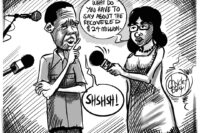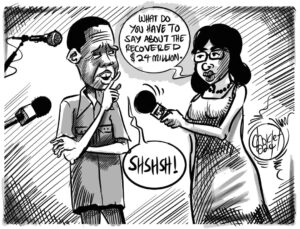THE Commonwealth Lawyers Association (CLA) has urged the Judiciary in Zambia to follow due process of the law in handling the matter against constitutional lawyer John Sangwa State Counsel who has been barred from appearing before any court for alleged professional misconduct.
In a notice issued to all judges last Friday, the Judiciary announced that Sangwa was not to appear before any Zambian court until the Law Association of Zambia (LAZ) had resolved all complaints against him.
But in a statement, Tuesday, the CLA expressed concern that Sangwa had been prevented from practicing in all courts of law by the direction of the judicial authorities in Zambia before LAZ could consider their complaint against him.
The CLA urged the Judiciary to follow the law in handling the matter involving Sangwa.
“Mr John Sangwa has been prevented from practicing in all courts of law by the direction of the judicial authorities in Zambia before a complaint that they have filed against him has been considered by his professional body; and that the Judiciary, which should uphold a right of due process, has not permitted due process in this case to run its course. In view of the concerns expressed, the CLA encourages all concerned to uphold due process and the rule of law in all circumstances,” the statement read.
It noted that all governments ought to ensure that lawyers were free to operate in a conducive environment free from threats or harassment.
“Recalling that the basic principles on the role of lawyers were adopted by the United Nations Congress on the prevention of crime and the treatment of offenders, Havana, Cuba, August 27 to September 7, 1990; noting that the basic principles state at paragraph 16: ‘Governments shall ensure that lawyers are able to perform all of their professional functions without intimidation, hindrance, harassment or improper interference; and shall not suffer, or be threatened with, prosecution or administrative, economic or other sanctions for any action taken in accordance with recognized professional duties, standards and ethics. Noting also that the basic principles state at paragraph 19: ‘no court or administrative authority before whom the right to counsel is recognized shall refuse to recognize the right of a lawyer to appear before it for his or her client unless that lawyer has been disqualified in accordance with national law and practice and in conformity with these principles,” read the statement.
“And noting finally that the basic principles state at paragraphs 27, 28 and 29: ‘27. Charges or complaints made against lawyers in their professional capacity shall be processed expeditiously and fairly under appropriate procedures. Lawyers shall have the right to a fair hearing, including the right to be assisted by a lawyer of their choice. 28. Disciplinary proceedings against lawyers shall be brought before an impartial disciplinary committee established by the legal profession, before an independent statutory authority, or before a court, and shall be subject to an independent judicial review. 29. All disciplinary proceedings shall be determined in accordance with the code of professional conduct and other recognized standards and ethics of the legal profession and in the light of these principles’.”













One Response
No country is an island in a globalised World.